10 plant gurus on how they’ll experiment during another dry year in SoCal
In case you totally tuned out during the holidays and haven’t heard, Southern California water agencies have already declared a drought emergency for 2023, so expect another tight year for irrigating gardens and lawns (if yours survived last summer’s restrictions).
This is a good time to start planning how to manage all this in your yard, so we asked professional plant people and influencers for a little inspiration: What are their 2023 resolutions for their personal gardens or yards? Not surprisingly, most are looking at ways to conserve water.
Luckily, January is a great month for garden planning and learning. Check out the activities in our calendar and get inspired by what 10 SoCal plant experts are planning in the coming year:
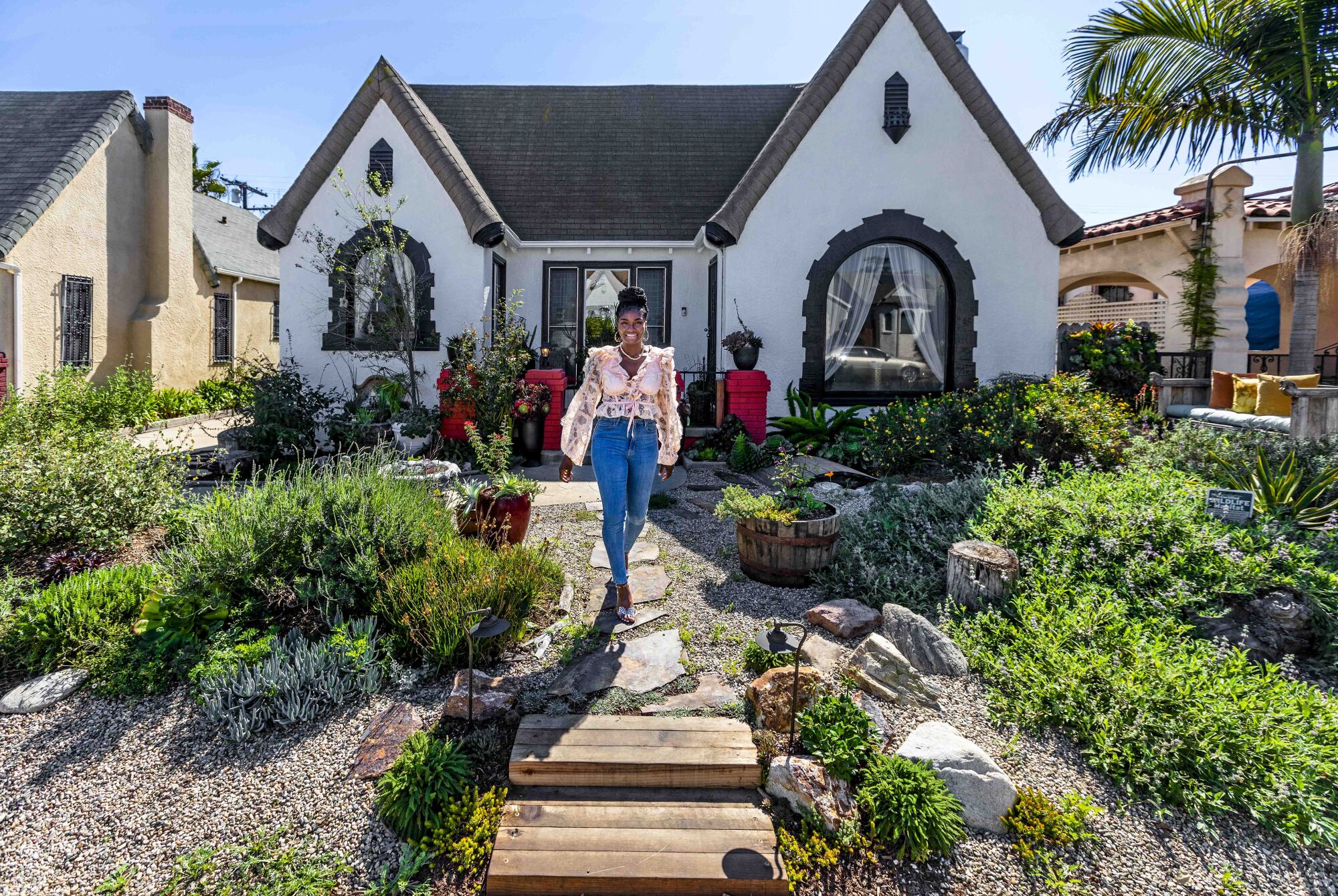
Landscape designer Brandy Williams of Garden Butterfly.
(Ricardo DeAratanha / Los Angeles)
- Brandy Williams is a landscape designer at Garden Butterfly who uses native plants, succulents and other drought-tolerant varieties to transform her clients’ yards. But at home, Williams wants to grow more succulents indoors in 2023. “Cacti and aloe are the only types of succulents I have had success with indoors,” she wrote in an email. “Medicinal aloe performed well in bright light and little water near a window. My indoor cacti garden consists of beginner-friendly Mammillaria and Trichocereus grandiflorus in our kitchen garden window — a safe place to display prickly cacti specimens.”
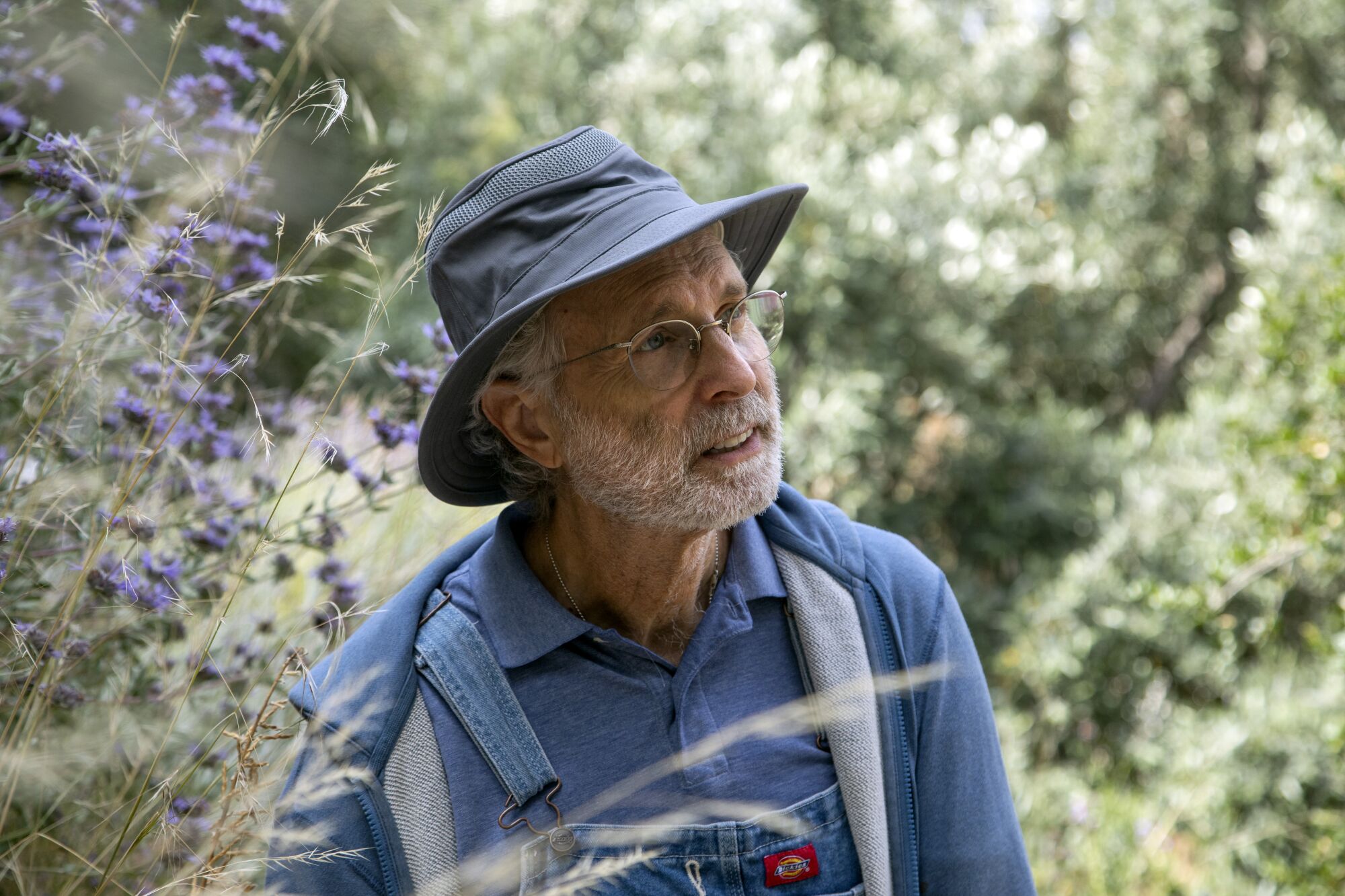
Bruce Schwartz has immersed himself in a lush growth of California native plants at his Eagle Rock house.
(Myung J. Chun / Los Angeles Times)
- Bruce Schwartz is a native-plant collector and grower at L.A. Native Plant Source nursery, based in his hilly Highland Park yard. Schwartz resolves to use only harvested rainwater for irrigation by increasing his storage capacity from 800 to 1,000 gallons before July 2023. Harvested rainwater won’t keep a lawn or thirsty plants alive, he wrote, “but for a garden of Southern California natives, it’s a near-perfect solution. I only had 400 gallons early in 2022, and was still able to water all my seedlings and some newer plants with rainwater for the entire summer. Using harvested rainfall is a truly wonderful feeling — guilt-free watering!”
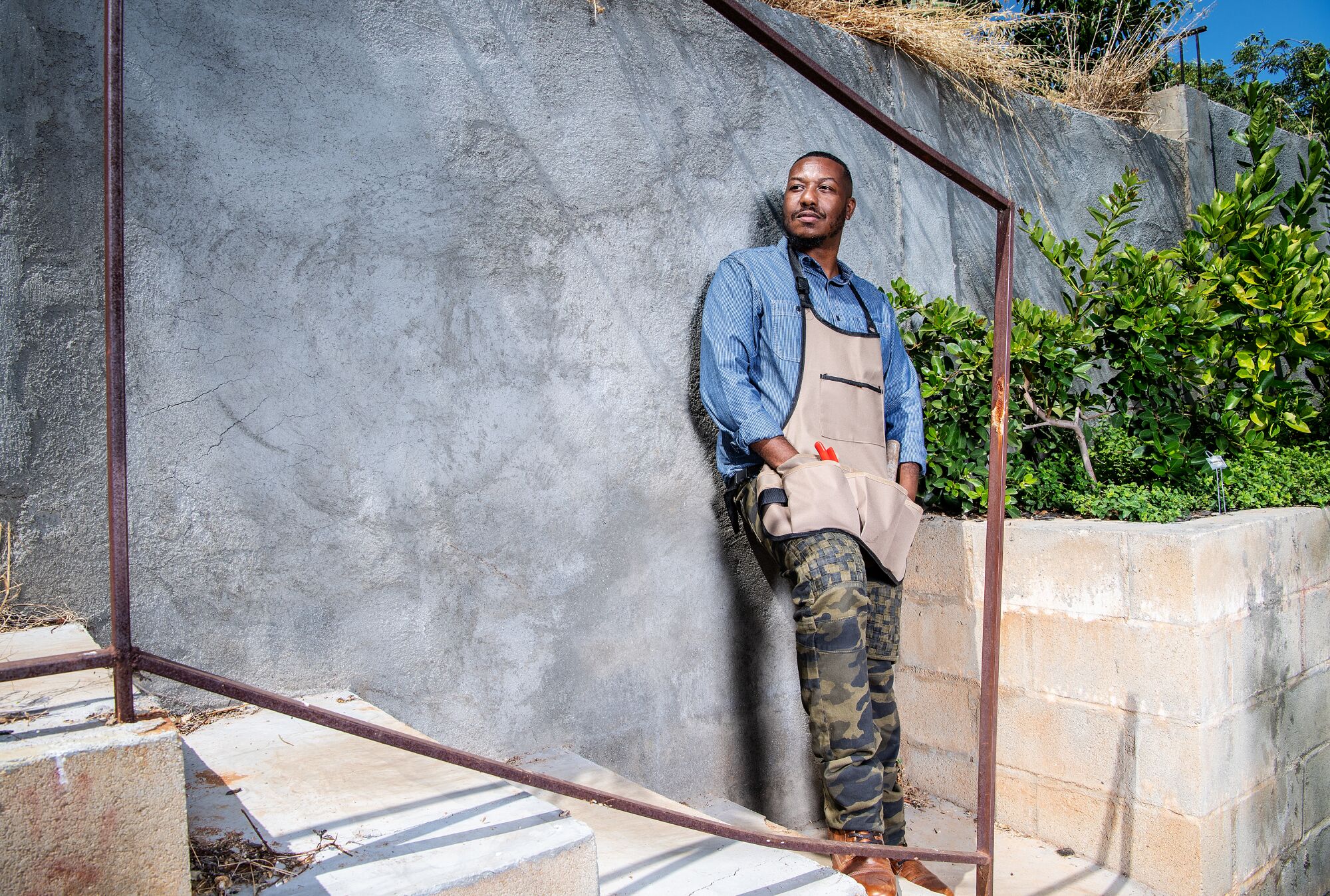
Ken Sparks at his home garden in East Los Angeles.
(Mariah Tauger / Los Angeles Times)
- Kenneth Sparks, a.k.a. Farmer Ken, is an urban farmer and garden trainer who sells his produce at the Altadena Farmers Market and at mobile Prosperity Market in Los Angeles. With the help of crowdfunding, he recently moved his farm from his East L.A. backyard to about an acre in Hemet, where he’s already added 150 fruit trees. “My New Year’s resolutions are to incorporate even more flowering plants for a pollinator-friendly habitat and add more drought-tolerant fruiting plants and trees, such as pomegranates, figs, olives, grapes and prickly pears, and more late-season varieties to fill in seasonal production gaps.”
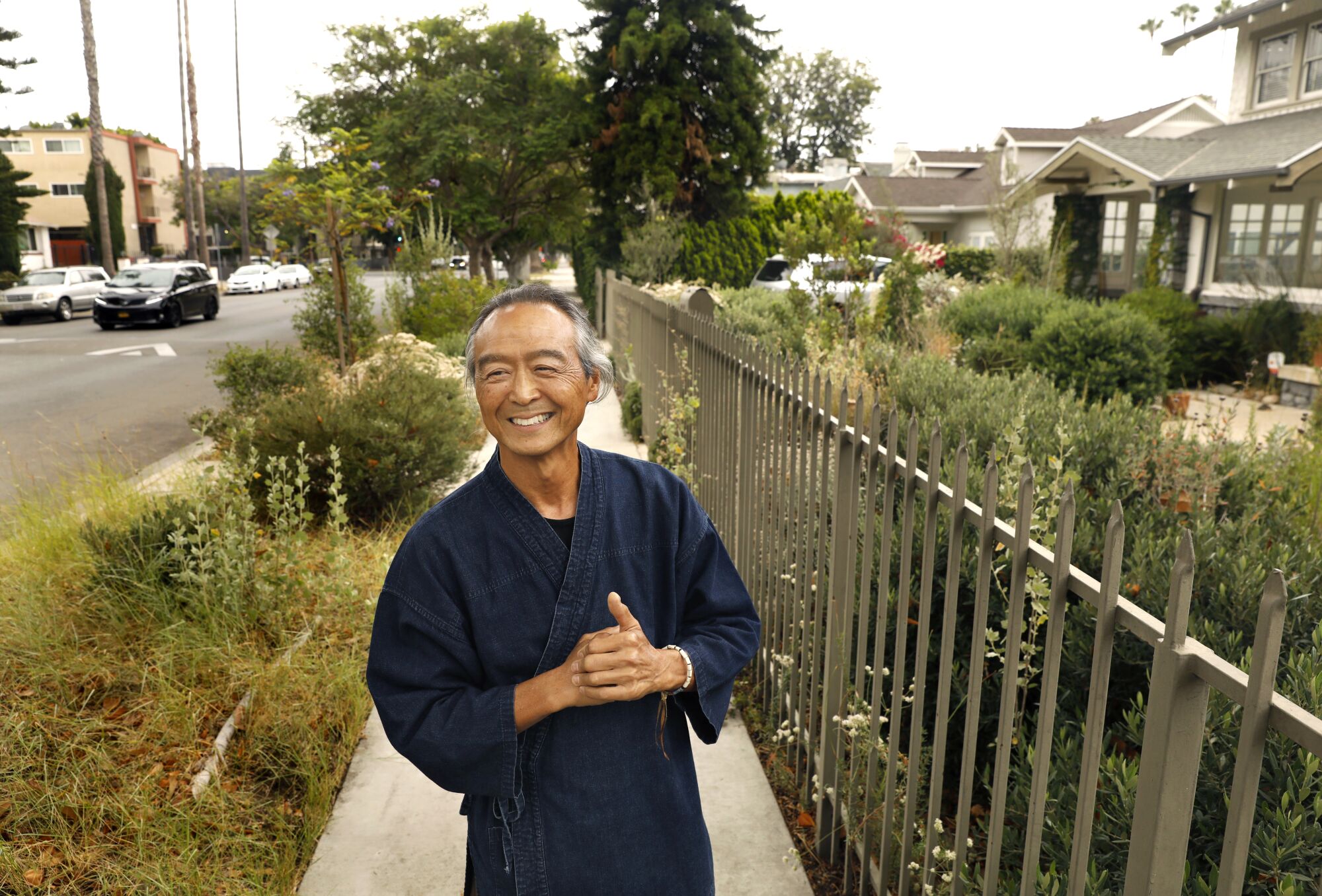
Georg Kochi at his Koreatown Craftsman home, where his yard is filled with native plants.
(Christina House / Los Angeles Times)
- Georg Kochi tore out the lawn in his vintage Koreatown yard and replanted with California natives, reducing his monthly water bill to less than $24. Among his goals for 2023: doubling his efforts at water conservation and composting, such as “using a black trash bin to catch excess roof water which would overflow my catch barrels. It provides 50 gallons or more of rainwater for hand-watering weeks later.” He also plans to reduce his green bin loads by “returning fallen leaves, tree debris and branches back into the garden.”
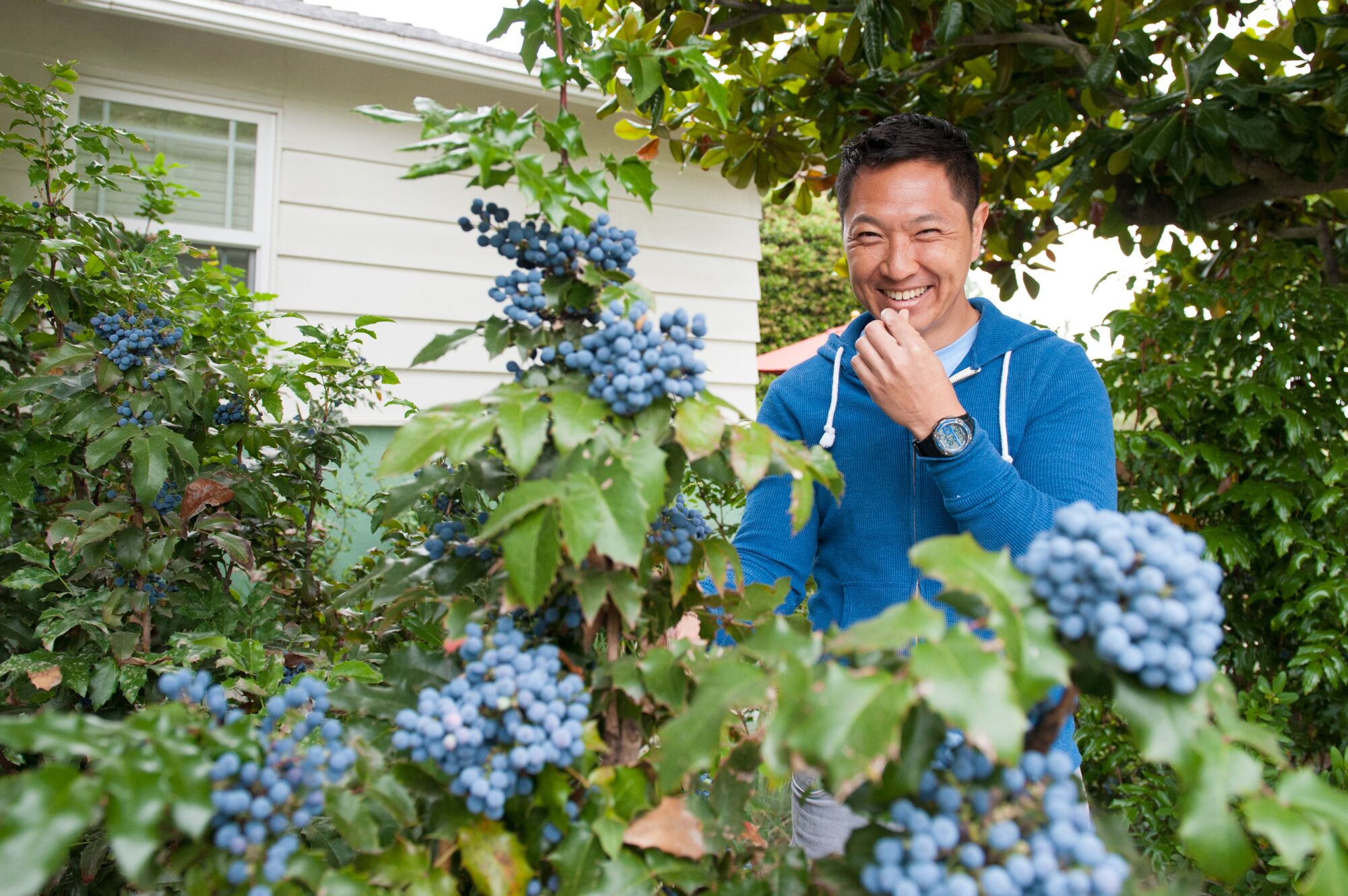
Isara Ongwiseth.
(Lesly Hall)
- Isara Ongwiseth, senior landscaper designer for Form L.A. Landscaping, wants to see how his existing native plants expand without any irrigation water. “Every designer’s garden is one part laboratory, and I actively change things around,” he wrote, but in 2023, he’s going to stop and see what happens. “Through the hot summer, my California buckwheat, Cleveland sage and Indian mallow brought bees, butterflies and delight, and demanded only seasonal rain. … This could be the direction for my next garden project and/or my clients’ yards.”
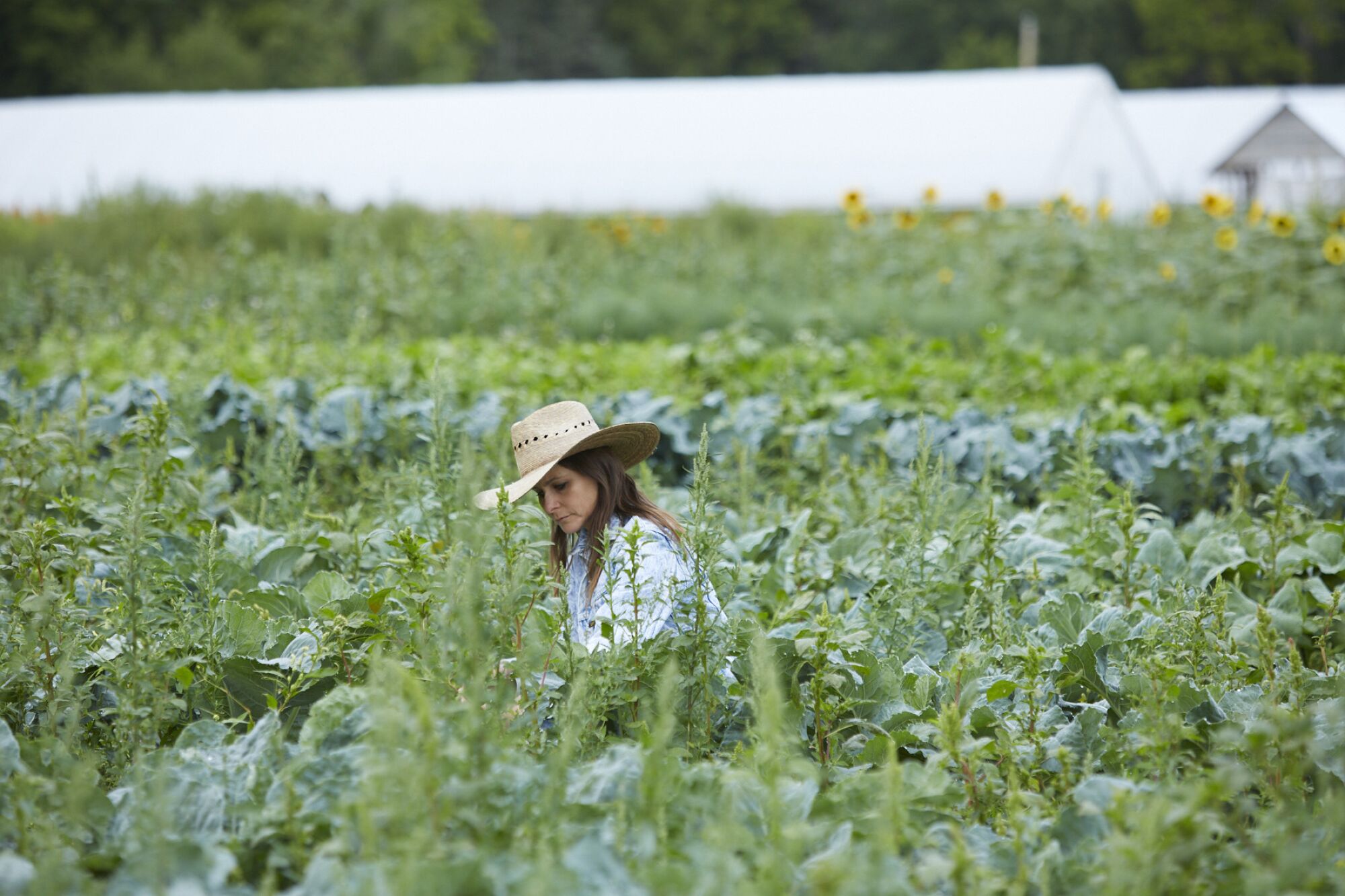
Urban farmer Lauri Kranz of Edible Gardens L.A. and L.A. Homefarm.
(Yoshihiro Makino)
- Lauri Kranz is an urban farmer and garden builder at Edible Gardens L.A. and co-owner of the new L.A. Homefarm store in Eagle Rock. “My resolution is to devote more time and care to growing vegetable, herb and flower seedlings,” she wrote. “I’ve done it for years, with some success and many failures. At first it was the animals; birds, raccoons and the like getting most of the sprouts. … Now it is carving out the time to devote to their care. I am working on making their daily care part of my morning ritual — like coffee!”
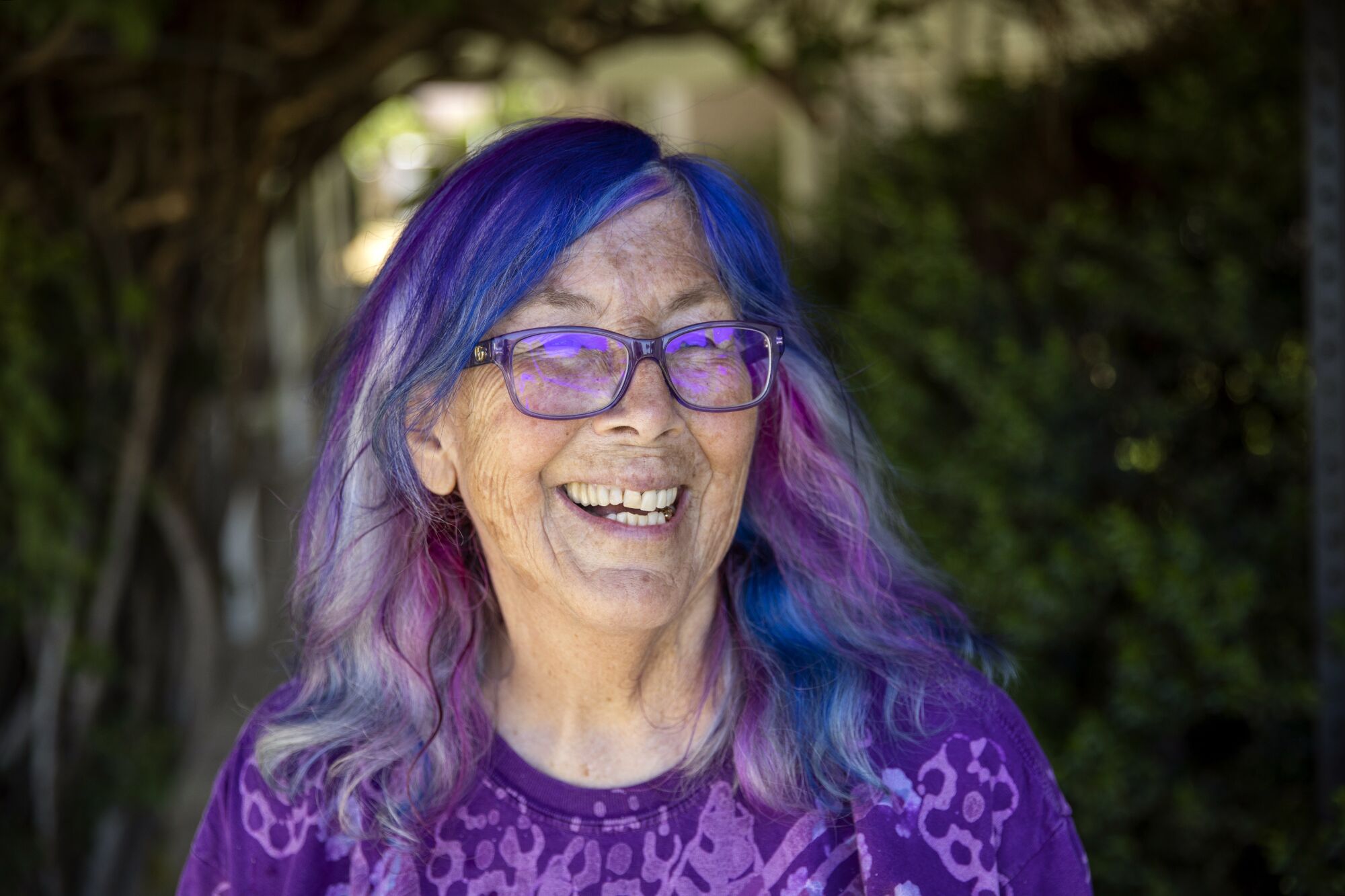
Leigh Adams, a landscape designer for Studio Petrichor.
(Alisha Jucevic / For The Times)
- Leigh Adams, native-plant landscape designer with Studio Petrichor, will be “trimming the trees and hedgerow around my property before the birds begin nesting, enhancing the density of shade, wildlife shelter and sunlight,” she wrote. “The trim from the trees becomes mulch for the garden, and part of the next action item: emptying my bioswales of logs.” The rich soil accumulating in the swales will side dress her fruit trees, the new tree cuttings will go in the bottom of the swales to support fungi and absorb water, and “the older, decomposing logs go back on top and continue to break down and become nutrient-rich soil.”
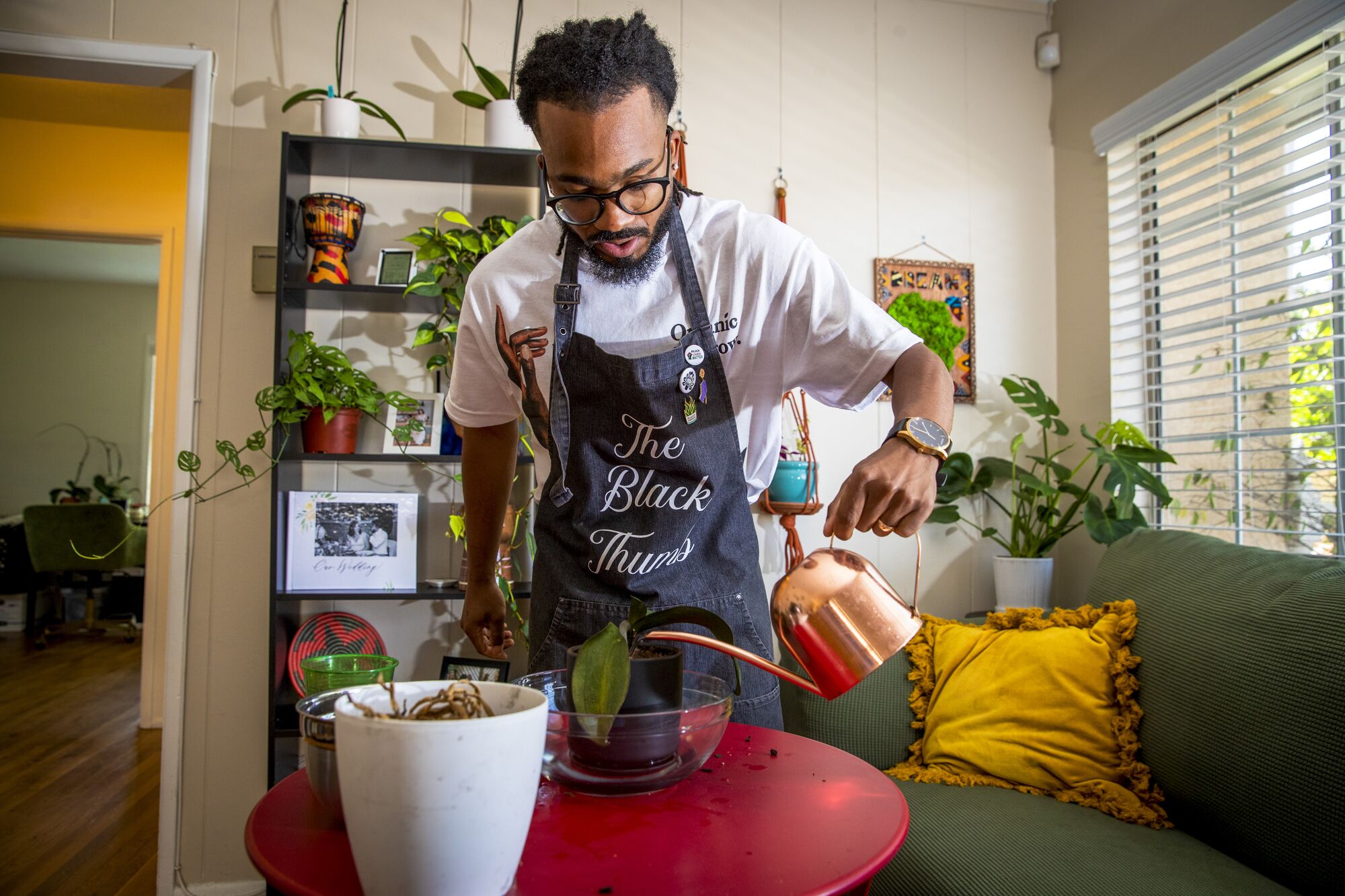
Terry Richardson caring for his orchids.
(Allen J. Schaben / Los Angeles Times)
- Terry Richardson, a.k.a the Black Thumb, is a physical therapist who teaches about orchid care on Instagram as @theblkthumb. In 2023 he wants to “increase self-sustainability through expanding our veggie garden,” he wrote, “and use plant care more as a mindful practice, a kind of meditation done with gratitude. I want to get back to using plant care as a way to ground myself, check in with myself and spark gratitude in the growth.”
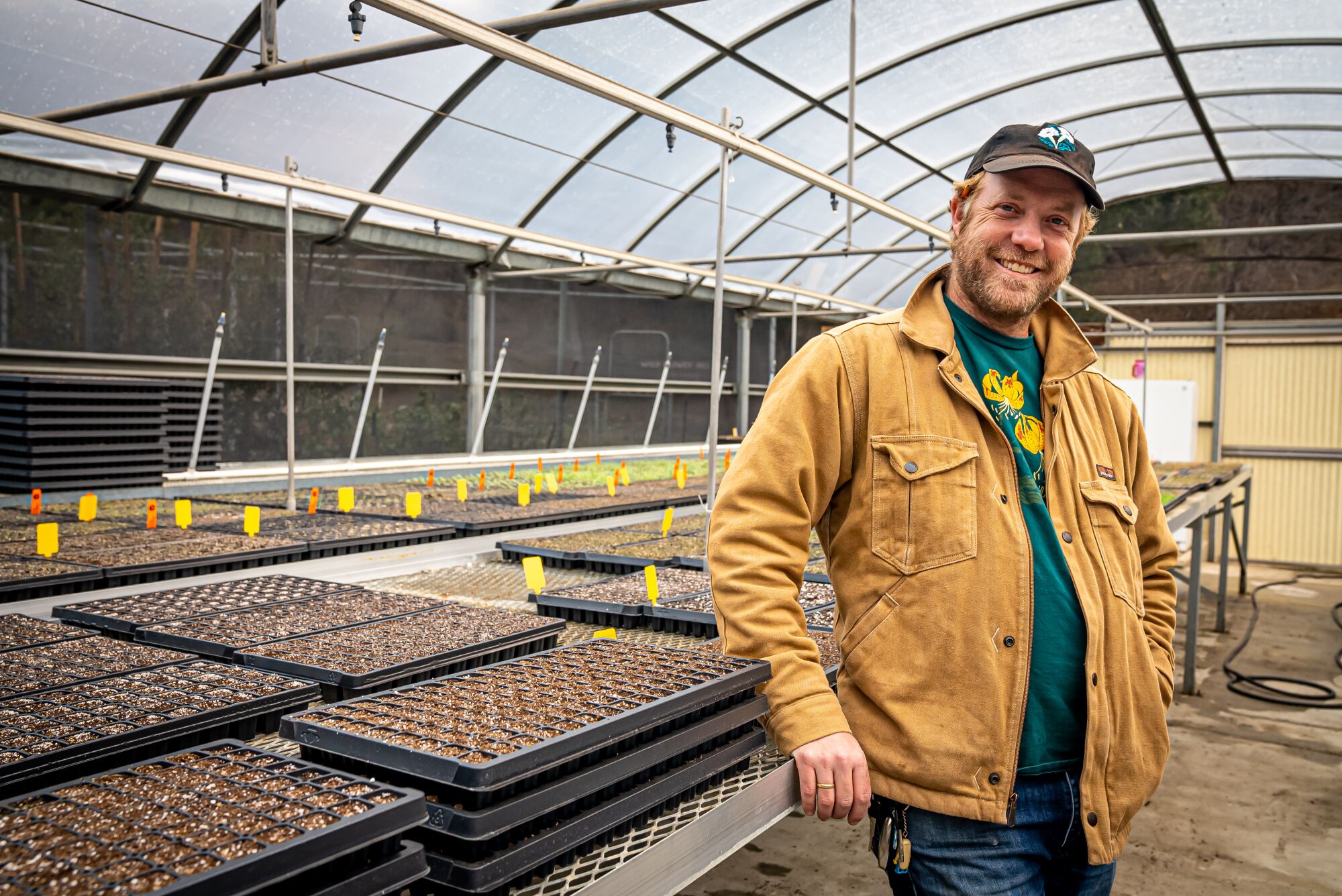
Tim Becker, director of horticulture for the Theodore Payne Foundation.
(Marie Astrid Gonzalez)
- Tim Becker, horticulture director of the Theodore Payne Foundation, sees water conservation as “one of the most pressing issues of our generation,” he wrote. So at his West Adams home Becker wants to “capture, infiltrate and sequester as much precipitation, greywater and recycled water as possible. This means rain swales, redirecting gutters, installing rain barrels, putting in some pumps, designing my space appropriately, applying mulch and being hyper aware about how much precious potable water is put down.”
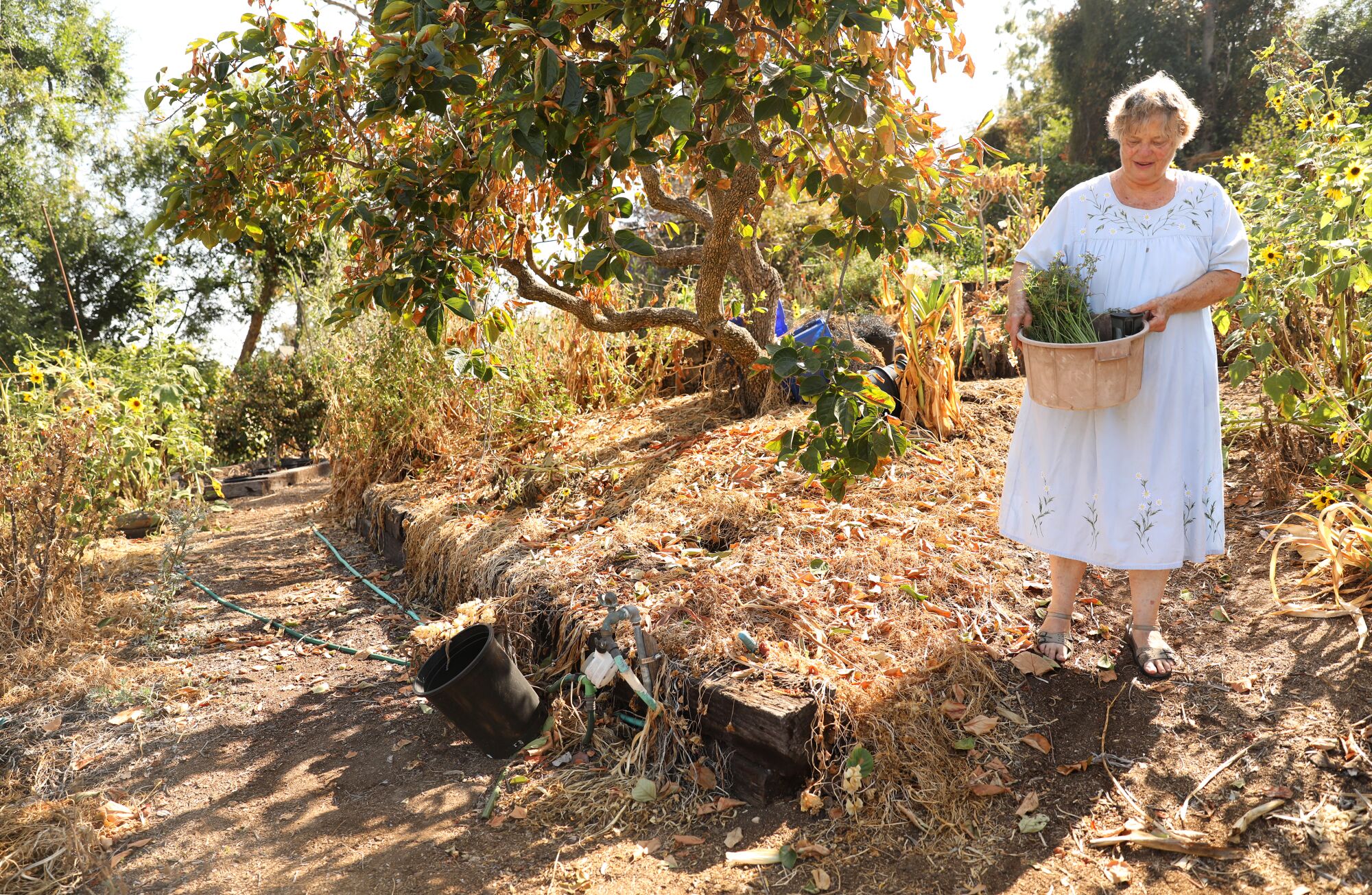
Master gardener Yvonne Savio walks through her garden at home in Pasadena.
(Los Angeles Times)
- Yvonne Savio, master gardener and creator of GardeninginLA.net, wants more flower bulbs and salvias around her Pasadena home. Salvia (a.k.a. sage) comes in many varieties, “and I’ve been thoroughly impressed with their growth filling in the garden with their attractive foliage and colors,” she wrote. And bulbs “come up each year despite increased heat and lessened water … and I don’t have to do anything more with them. They multiply in place, and then I dig up the clumps, spread them throughout my garden and give them to gardening friends.”

Now here are plant-related activities for January. If you’d like to include events in my monthly garden calendar, email information by the third week of the preceding month to [email protected].
Jan. 7, 21 and Feb. 4
Foundations of native plant gardening, nine hours of instruction over three days by botanist Terry Huang from 9 a.m. to noon each day at the Theodore Payne Foundation, 10459 Tuxford St. in Sun Valley. Huang, director of living collections, learning and engagement at South Coast Botanic Garden, will discuss seed saving, rhythms of our climate, personalities of the state’s unique flora and “how to better garden with the earth.” Expect classes to be taught indoors and out. Class sizes will be small, and advance registration is required. $420 ($350 for foundation members). theodorepayne.org
Jan. 10
The Orage County Organic Gardening Club presents ‘Caring for Your Garden Tools,’ a free workshop taught by master gardeners Jon Schara and Ed Andrade about how to clean, sharpen, disinfect and protect garden tools, 7 p.m at Centennial Farm in the Orange County Fairgrounds, 88 Fair Drive in Costa Mesa. Bring your clippers or other tools to the club’s January meeting, which is open to all. facebook.com
Jan. 12
Rose culture and pruning, a talk about rose care in California by John Bishop, horticulture director emeritus for the Sherman Library & Gardens, from 10 to 11:30 a.m. at the gardens, 2647 E. Coast Highway in Corona Del Mar. Tickets are $20 ($10 members). thesherman.org
Sherman Library & Gardens Lunch & Lecture presents notable gardens of England with master gardener Yvonne Savio, creator of GardeninginLA.net. Savio will discuss her visits to the Chelsea Flower Show, King Charles’ Highgrove Organic Sustainable Garden and the garden of Marjery Fish, the “mother” of cottage gardening, and techniques she learned there that can be applied to gardens in Southern California. Lunch begins at 11:30 a.m. and the talk begins at noon at 2647 E. Coast Highway in Corona del Mar. Tickets for the lunch and lecture are $50 ($40 for members). Lecture only is $5 (members enter free). thesherman.org
Free screening of “Saging the World,” a short 2022 documentary about white sage poaching, by Rose Ramirez and Deborah Small in partnership with the California Native Plant Society, at Friendship Auditorium, 3201 Riverside Drive in Griffith Park. The doors open at 7 p.m., with snacks available, and the film begins at 7:30 p.m. followed by a discussion and Q&A session with filmmaker Ramirez, a California Indian basketweaver of Chumash and Yaqui descent, and botanist Rico Ramirez of the Gabrielino-Shoshone Nation. The event is co-sponsored by the Theodore Payne Foundation; Southern California Horticultural Society, Los Angeles/Santa Monica Mountains chapter; and San Gabriel Mountains chapter of the California Native Plant Society. Admission is free, but registration is required by Jan. 10. eventbrite.com
Jan. 13
Bare-root rose sale and rose talk by Tom Carruth, former rose breeder and current curator of the rose collection at the Huntington Library, Art Museums & Botanical Gardens, 2:30 to 5 p.m. at the Huntington’s Rothenberg Hall. Carruth will review the roses available at the sale, discussing colors, scents, growth habits and best planting practices. Bare-root roses will be available for purchase after the talk. Free with advance reservation. huntington.org
Propagating California native plants from seed is a hands-on workshop taught by horticulturist Alejandro Lemus from 9:30 a.m. to noon at the Theodore Payne Foundation, 10459 Tuxford St. in Sun Valley. The workshop covers basic seed physiology, seed viability, germination cues and pretreatments, sowing and aftercare. Each participant will leave with a flat of 50 starts for their own garden. Advance registration required. $85 ($75 members). theodorepayne.org
Propagating California native plants is a hands-on workshop taught by Laura Breidenthal from 1 to 3:30 p.m. at the Theodore Payne Foundation nursery, 10459 Tuxford St. in Sun Valley. Breidenthal, a seed program technician at the foundation nursery, will explain how to start and grow native plants from cuttings. Expect part of the instruction to be outside. Advance registration required. $85 ($75 members). theodorepayne.org
Jan. 14, 28, Feb. 11 and March 4
Four-Part Mindful Garden Design with Shawn Maestretti, from 8:30 a.m. to 1:30 pm. each day at the Theodore Payne Foundation, 10459 Tuxford St. in Sun Valley. Maestretti, a landscape architect and arborist at Studio Petrichor, will lead participants in designing their own gardens with instruction in design elements, ways to capture rainwater and nurture living soil, choosing indigenous, climate-appropriate plants and repurposing materials. Registration is required by Jan. 4. Tickets are $450 for individuals ($400 for members) and $550 for couples working on one project ($500 for members). theodorepayne.org
Jan. 14
Growing a Backyard Orchard, a class about growing and maintaining fruit trees in your backyard, taught by Fruitstitute founder Joanna Glovinsky, 11 a.m. to noon at Fig Earth Supply, 3577 N. Figueroa St. in Mount Washington. Tickets are $10. figearthsupply.com
Container gardening in Southern California, a class taught by master gardener Yvonne Savio at 1 p.m. at the Wilshire branch of the Los Angeles Public Library, 149 N. St. Andrews Place in Koreatown. Admission is free.
Jan. 15
2nd Tarzana Native Plants Fair, 11 a.m. to 4 p.m. at the Tarzana Community & Cultural Center, 19130 Ventura Blvd. in Tarzana, features native plants and books for sale, workshops, live music performances including local band Sage Against the Machine, and garden planning advice. The fair is organized by Valley Art Workshop, and participants include the Theodore Payne Foundation. Los Angeles/Santa Monica Mountains chapter of the California Native Plant Society, Tree People and Santa Monica Mountains Fund. Admission is free. tarzananativeplantfair.com
Jan. 18
California native plants for containers, a class taught by Theodore Payne Foundation nursery sales manager Flora Ito, 9-10 a.m. at the foundation nursery, 10459 Tuxford St. in Sun Valley. Learn which native plants do best in containers. $25 ($20 members) theodorepayne.org
Jan. 21
Finding Our Way Home With Fungi, a walk-and-learn class sponsored by the Theodore Payne Foundation, from 1 to 3 p.m. in the Arroyo Seco in Altadena. Instructor Aaron Tupac, creator of the fungi education group called Exploring the Mycoverse, will explain the importance of fungi in rebuilding ecosystems and relationships between animals and plants. The walk is described as an easy/moderate uphill climb on an unpaved path. Wear closed-toe shoes and bring water and sun protection. Register to get information about where to meet for the walk. Tickets are $35 ($25 for members, children under 12 can join for free). theodorepayne.org
Oxnard Native Plant Fest, 11 a.m. to 4 p.m. at the Oxnard Performing Arts Center, 800 Hobson Way in Oxnard. The event includes plant sales, live music performance, including Sage Against the Machine, vendor workshops, food trucks, arts and crafts and other activities. Admission is free. visitoxnard.com
Jan. 23
“Pushing Limits: Growing Orchid Species Outdoors in Southern California,” a presentation by orchid grower Scott McGregor at the South Coast Orchid Society meeting from 7 to 9 p.m. at the Whaley Park Community Center, 5620 E. Atherton St. in Long Beach. McGregor will discuss his successful experimentation in growing orchids outdoors as well as new species he recommends and tips for outdoor orchid growing. Admission is free. southcoastorchidsociety.com
Jan. 25
Native plant maintenance basics, a walk-and-talk class led by native plant enthusiast Erik Blank from 9 to 10 a.m. at the Theodore Payne Foundation demonstration garden, 10459 Tuxford St. in Sun Valley. Participants should wear closed-toe shoes and long pants, and be prepared for an hour walk on sometimes steep and uneven surfaces. $15 ($12 members). theodorepayne.org
Jan. 28
Seed collecting basics, two classes taught by Descanso Gardens’ plant propagation horticulturist, Frank Obregon, about how to collect seeds and plant your own spring garden, offered from 10 to 11:30 a.m. and again from 2 to 3:30 p.m. at the gardens, 1418 Descanso Drive, La Cañada Flintridge. Tickets are $30 ($25 for members). descansogardens.org
Understanding oak trees, a walk-and-talk class led by arborist Alison Lancaster, from 9 to 11 a.m. at the Theodore Payne Foundation, 10459 Tuxford St. in Sun Valley. The class includes instruction in oak tree life cycles, including fire adaptation, non-harmful insects that use oaks as habitat, disease and pests that can threaten the trees, and maintenance tips, including drought-conscious watering, Tickets are $35 ($25 members). theodorepayne.org
Ask an arborist about California native trees, a walk-and-talk led by arborist Alison Lancaster, 1 to 3 p.m. at the Theodore Payne Foundation, 10459 Tuxford St. in Sun Valley. The walk around the foundation’s grounds will include information about planting, pruning, watering, pests and diseases of sycamore, Torrey pine, palo verde, Catalina ironwood and other native trees. Bring photos and questions about your trees at home. Tickets are $35 ($25 members). theodorepayne.org
Jan. 29
Herb walk at Ernest E. Debs Regional Park with Herb Club Los Angeles, a new group “designed to get young people to connect with the land and get to know their plant neighbors,” according to founder Andrea Jimenez. “Herb walks are accessible to beginner herbalists, botanists and just about anyone interested in reconnecting with the land.” The two-hour walk starts at 10 a.m. at 4235 Monterey Road in Lincoln Heights. Walkers are encouraged to bring a notepad, pen and water. Participation is free but registration is required. herbclubla.com
More ways to shake up 2023
For all the latest Life Style News Click Here
For the latest news and updates, follow us on Google News.
